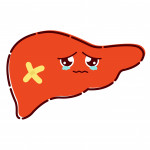Merck’s Zepatier (grazoprevir/elbasvir) plus Gilead Sciences’ Sovaldi (sofosbuvir), with or without ribavirin, cured genotype 3 of hepatitis C virus (HCV) at high rates in a recent trial.
Publishing their findings in the journal Hepatology, researchers conducted a Phase II randomized open-label study, known as C-ISLE, of Zepatier plus Sovaldi with or without ribavirin among those with genotype 3 of HCV and compensated cirrhosis (the milder form of the severe liver disease).
Those who had not been treated for hep C before were given Zepatier plus Sovaldi and ribavirin for eight weeks or Zepatier plus Sovaldi for 12 weeks. Those who had been previously treated with interferon and ribavirin received Zepatier plus Sovaldi with or without ribavirin for 12 weeks or Zepatier plus Sovaldi for 16 weeks.
Ninety-one percent (21 of 23) of the first-timers to treatment who were treated for eight weeks achieved a sustained virologic response 12 weeks after completing therapy (SVR12, considered a cure), as did 96 percent (23 of 24) of those treated for 12 weeks. Among those who had been treated before, 94 percent (17 of 18) and 100 percent (17 of 17) of those treated for 12 and 16 weeks, respectively, were cured.
Five participants were not cured, including two who experienced viral relapse (both were treated for eight weeks), one who stopped treatment because of vomiting and cellulitis (a bacterial infection of the skin and tissues beneath the skin) and two who stopped because they withdrew their consent to participate in the study or were lost to follow-up.
The presence of mutations associated with drug resistance in participants’ HCV did not affect their chance of a cure.
The treatment regimen did not appear to affect insulin resistance among the participants.
Five participants reported serious adverse health events, including pneumonia, chest pain, opioid overdose, cellulitis and decreased creatinine.
The study authors concluded that treating hep C with this regimen for longer than 12 weeks offered no additional benefit.
To read the study abstract, click here.







Comments
Comments